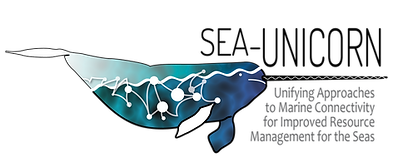
Workshops & round-tables
Alongside the conference, applied workshops, round-tables and breakout sessions will be held to promote the integration of marine connectivity knowledge into decision-support tools for environmental management and policies. This will help define appropriate conservation measures for spatial planning and governance, in Europe and beyond.

The three main issues below will be explored:
2
-
Marine Functional Connectivity in a Changing Climate (open to 20-30 scientists)
-
Marine Trophic Connectivity in Seascape Conservation Management (open to 20-30 scientists/managers)
-
Co-Designing Marine Connectivity Science for the Ocean We Want (gathering up to 100 stakeholders)
5
Registration for these side-events will be open in February 2024, with priority to participants with an abstract accepted in one of the theme sessions of the conference.
Marine Functional Connectivity in a Changing Climate: past, ongoing & future trends (1 day - probably on May 27th)
Climate Change is reflected in changes in sea level and oceanic currents, but also in water temperature, pH, oxygenation levels, vertical stratification and salinity, all of which can affect Marine Functional Connectivity. This applied workshop aims to gather researchers who have worked on the causal or statistical links between these ocean variables and Marine Functional Connectivity, either experimentally, empirically or theoretically. The objective is to build on their expertise to advance our ability to anticipate the evolution of Marine Functional Connectivity under different Climate Change scenarios.
For this, we aim to:
-
List the links already explored on the basis of presentations by workshop attendees (syntheses are welcome),
-
Identify federating or breakthrough questions on the relationships between ocean variables and Marine Functional Connectivity,
-
List the main knowledge gaps about these relationships and identify the scientific communities that can contribute to fill them.
One of the expected outcomes of the workshop is the cowriting of an up-to-date and systematic review on predicting Marine Functional Connectivity in a changing climate, to serve as a basis for future large-scale collaborative projects on the topic.

Organizers
2
-
Katell Guizien (OOB/CNRS - France)
-
Manuel Hidalgo (IEO/CSIC - Spain)
-
David Goldsborough (Van Hall Larenstein - The Netherlands)
-
Maria Beger (Univ. of Leeds - UK)
Marine Trophic Connectivity in Seascape Conservation Management (1 day - probably on May 27th)
Trophic interactions drive a large part of spatial connectivity through migratory and foraging movements. Both types of movements play an important role in maintaining essential fluxes of energy and matter responsible for the biodiversity and healthy functioning of marine ecosystems. Consequently, the integration of spatial connectivity and species trophic interactions is essential for the design of effective area-based protection measures and management strategies. However, there is as yet no consensus on how to achieve this, despite growing calls for ecology-based management frameworks that consider trophic connectivity.
The aims of this workshop are to:
-
Discuss the relevance of trophic connectivity for marine conservation and management, based on presentations made by participants,
-
Identify and list the most relevant data on foraging movements that allow assessing trophic connectivity
-
Discuss how these data could contribute to improved MPA network design and management.
One of the expected outcomes of the workshop is a perspective paper addressing how trophic connectivity should be characterized and measured to be adequately integrated into seascape management. Participants will also be encouraged to contribute to a global systematic mapping/review on marine trophic connectivity.

Organizers
2
-
Andreu Blanco (Univ. of Vigo - Spain)
-
Lucia Lopez Lopez (IEO/CSIC, - Spain)
-
Tamar Guy Haim (IOLR - Israel)
-
Francisco Barboza (Univ. of Tartu - Estonia)
Co-Designing Marine Connectivity Science for the Ocean We Want
(1 day with French & international stakeholders - probably on May 31st)
The global ocean is a colossal, three-dimensional living ecosystem. It connects 1.2 million km of coastline that is home to 40% of the Earth’s human population. Consequently, efforts to manage marine ecosystems in one place will only be successful if they are also deployed in other parts of the ocean that are directly connected - by the migration of wildlife, and/or the transport by currents of heat, salt, nutrients, pollutants, plankton and the larvae of many organisms. Because climate change and human activities are dramatically altering patterns of ocean connectivity, we need well-designed science to give stakeholders the information they need to achieve international sustainable development goals that depend on ocean services. To reach this understanding, we need to bring together marine connectivity scientists with ocean professionals, businesses, managers, and other stakeholders, so that we can co-design the marine science we need for the ocean we want.
To this aim, the Ocean Knowledge Action Network, Marine Life 2030, the French GDR OMER (through its working group O-CONNECT) and the COST action SEA-UNICORN will use the occasion of the I-MarCo 2024 conference to open a dialogue to help understand the most pressing societal needs for marine connectivity science. For this, we aim to bring together key stakeholders from government, business, and civil society organizations to engage with the world’s top marine connectivity scientists. We will host round-tables, workshops, and breakout sessions designed to share knowledge and expertise between all actors and have open dialogues and more focused co-construction exercises about the marine connectivity knowledge needed for sustainable aquaculture, marine protected area management, high seas' governance, estuaries and lagoon management, fisheries, and more.
A white paper summarizing the meeting’s findings will be produced, with specific recommendations for the UN Decade of Ocean Science for Sustainable Development (Challenge 2: Protect and Restore Ecosystems & Biodiversity) and the 2025 One Ocean Science summit.
Organizers
2
-
Audrey Darnaude (MARBEC, Montpellier - France)
-
Céline Reisser (MARBEC, Montpellier - France)
-
Katell Guizien (OOB/CNRS, Banyuls - France)
-
Frank Muller-Karger (Univ. of Maryland - USA)
- Céline Eson (Biosphera Consulting, Paris - France)
-
Linwood Pendleton (OceanKAN - Paris, France)
-
Yael Teff-Seker (Univ. of California, Berkeley - USA)











